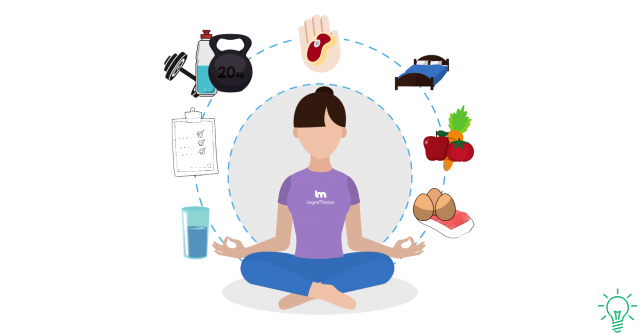Mental habits make us float or sink. The execution of a mental procedure that damages us involves a great expenditure of energy that ends up making itself felt in all areas of our life.

Last update: June 24, 2022
We adopt and establish mental habits unknowingly and sometimes they consume more energy than they should. Sometimes this depends on the education received, other times on the influence of the surrounding environment, certain beliefs or personality traits.
Often destructive or harmful mental habits are acquired, but they are so automatic that we do not even notice their existence. These habits end up conditioning the patterns we trace of the world, the conduct and behavioral repertoires that we ultimately perform.
Thus, on many occasions we end up building a life with harmful foundations which, in many cases, trigger chain reactions that cause intense discomfort or dissatisfaction. Some mental habits are characterized by the consumption of a large part of vital energy. We present them in the following paragraphs.
“Being aware of our prejudices, the degree of responsibility we have or in which cases we are comfortable speaks of the quality of our life”.
-Angelo Rull-
Counterproductive mental habits
1. Avoid responsibilities
Not making a commitment or postponing everything are mental habits that end up consuming energy. This is expressed in the tendency to assume a passive role towards responsibilities. It is true for work, but also for the couple, the family and society.
In this case, a person acts according to what others ask or do. He is convinced that he cannot oppose or resist what is imposed on him by the context. Underlying this is a lack of responsibility towards oneself.
This is a counterproductive mental habit because the efforts and the objectives are oriented towards extraneous realities. You don't focus on your goals and your dreams fade away.
2. Not knowing what you want, one of the energy-consuming mental habits
Action planning in search of the wrong reinforcement can also become a mental habit. It often occurs when we try to gain social reinforcement by sacrificing our desires or the satisfaction of our real needs. As in the previous case, the ego takes a back seat.
The truth, however, is that almost everyone knows what we want, but sometimes we are afraid to confess it, because this generates an intimate and entirely personal responsibility. Fear of failure or the feeling that one's desires don't matter may also come into play.
Continuous doubt and hesitation drain a lot of life energy. Sometimes choosing the objectives to pursue is more difficult and tiring than the actions necessary to achieve them. When uncertainty is a present and continuous distinctive element, there will certainly be emotional and cognitive exhaustion.
3. Lack scarcity mentality
We speak of a scarcity mentality when a person's perspective it is characterized by the mental habit of seeing oneself in a state of deficiency. Very fragile, not so strong, lacking in something… The common point is a feeling of uselessness that conditions actions, therefore life.
This mental habit ends up resulting in passivity, lack of optimism, constant fear and lack of initiative. The resulting situations are generally not very rewarding. In addition to this, similar conducts end up generating endemic circles.
What happens in this case is that it feeds on a limit that exists only in the mind. By leading life with that limit as a starting point, vision becomes shorter and the possibilities for improvement are reduced. This causes frequent discomfort that affects emotional energy.
4. Harmful mental habits: worrying constantly
Worry can be inevitable at times, but it is also a useless and stressful habit if continued indefinitely. We tend to think that this is a way to solve the problem or reduce its severity, it actually causes exhaustion and emotional distress.
5. Try to change others
It is clear that everyone can change if they want. However, this change cannot and should not be imposed, as it is neither useful nor morally acceptable. What we have power over is the choice of the people who come into our life.
Conversely, when someone changes to our liking, we will not only find frustration, but we will show intolerance towards that person. You have to accept when you are not compatible with another individual.
Conclusions
Certain mental habits can be countered with an exercise in mindfulness. First, it is important to note the ideas or beliefs we have about ourselves. Then subject them to the filter of reason and fight them with positive habits.


























